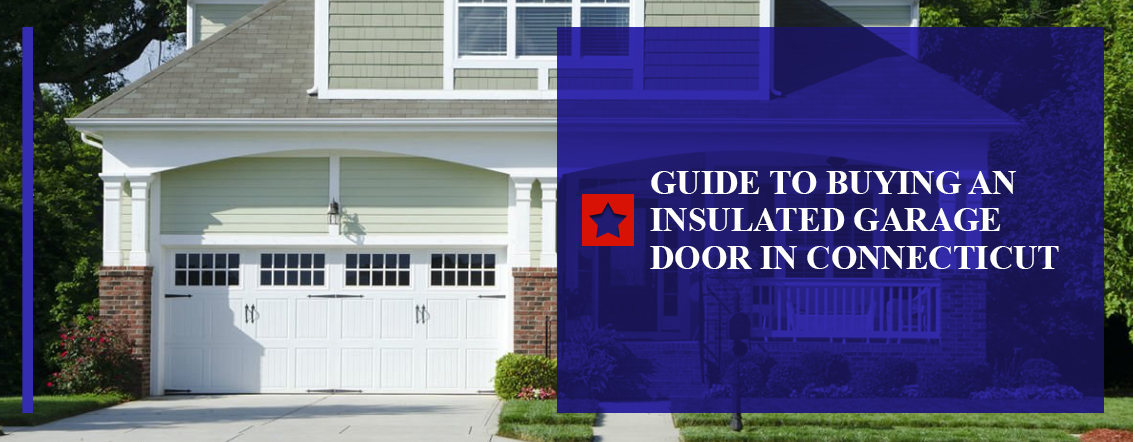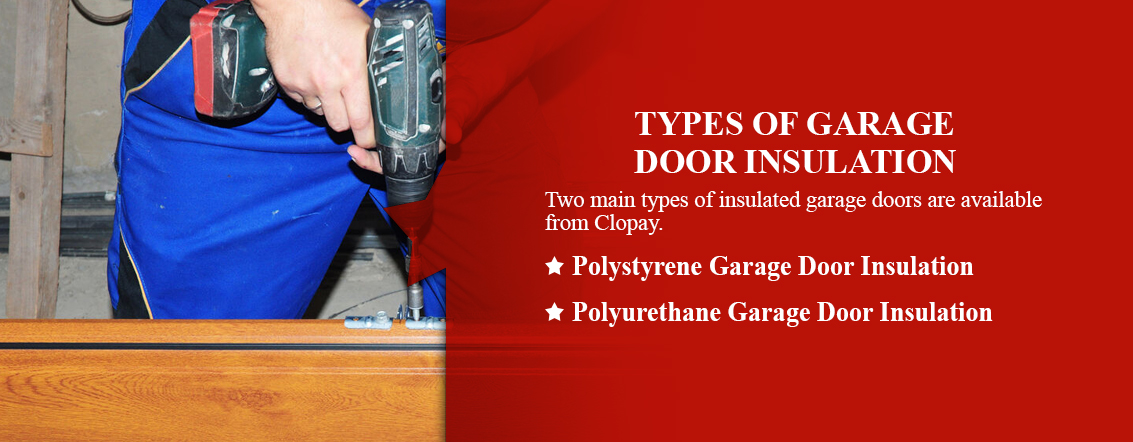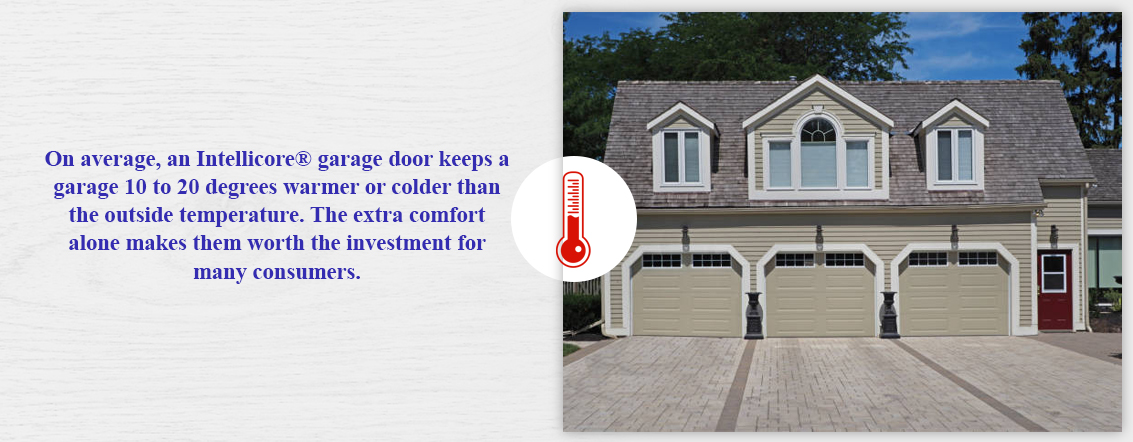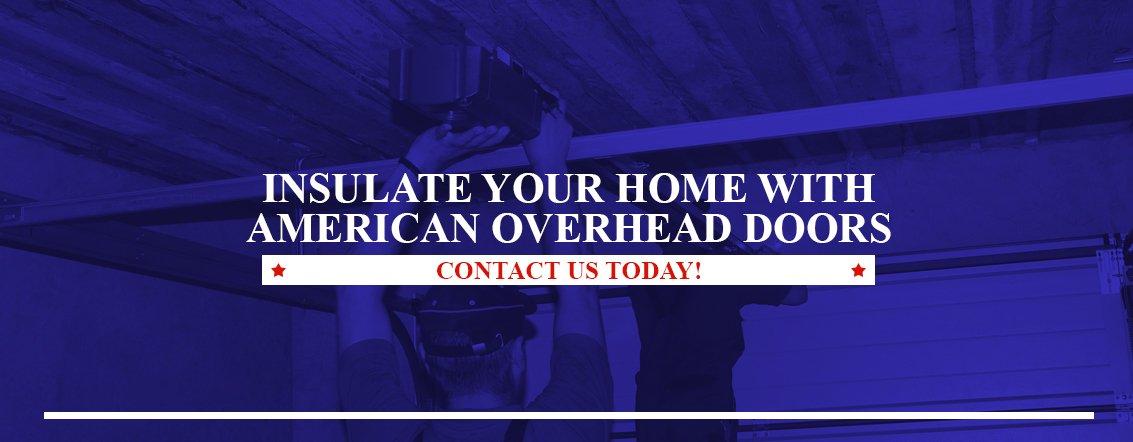
Let’s face it — Connecticut weather is unpredictable. Especially in the spring and autumn months, outdoor temperatures can spike or drop in a heartbeat. With an insulated garage door, you can always be sure you’re pulling in to a comfortable garage, no matter the season. An insulated garage door has many benefits that make it worth the cost. There’s also a lot that goes into choosing the right one for your Connecticut home, which is why we’ve put together this insulated garage door buying guide.
Browse Our Garage Door Inventory
Benefits of an Insulated Garage Door

Does an insulated garage door make a difference? Yes.
An insulated garage door is energy-efficient, convenient and comfortable. Insulation helps you better protect your garage door, and creates better conditions for both your car and anything else you store in your garage. The door itself may give your home more peace and quiet and can increase your curb appeal. All these benefits make an insulated garage door a fantastic investment.
1. Promotes Energy-Efficiency
Your home’s walls, ceilings, windows, floors and doors all create what’s called a “home envelope.” The barriers that keep the extremes outside allow you to heat and cool your home throughout the year. The more energy-efficient your home envelope — the better its insulation and the less it leaks air — the more money you’ll save.
The garage door is the largest entry point to your home and an often overlooked section of your home envelope. Part of the reason for this is that garages aren’t usually considered living spaces, so they have different construction standards. Any garage attached to the rest of your house shares at least one wall with another room. You might even have a bedroom directly above the garage.
So, even if you’re not piping heat into your garage, your home is still losing warmth. As warm air seeps in through a non-insulated garage door and into the outside world, your heating system works harder to compensate. Likewise, in the summer, your air conditioning quickly escapes through your garage door.
An insulated door keeps warm air in during cold weather and heat and humidity out during warm weather. According to one study, a garage with a non-insulated metal door will be about 30 degrees on a 20-degree winter day. On the same day in a garage with an insulated door, the temperature will be around 42 degrees. With one below freezing and the other above, an insulated door can make a huge difference in how you heat your home and help you cut down your energy bill, too.
2. Increases Durability
Over the years, garage doors take quite the beating. With regular use, the bottom panel of the door is making contact with a concrete slab many times a day. It might also be the victim of your kids’ backyard sporting events or take some flak from airborne pebbles on a windy fall day. Dents on your garage door can affect your home’s curb appeal. It’s crucial to look for a sturdy garage door that can withstand daily wear and tear.
Insulation adds extra rigidity to a garage door, which results in more durability. Many insulated garage doors have a solid panel of insulation sandwiched between two layers of steel or aluminum. Others are injected with foam that expands as it hardens, filling the space between the metal panels. Both of these types of insulation make a garage far less susceptible to dents.
The internal hardware of your garage also fairs better thanks to the milder internal temperature in your garage. Extreme temperatures can affect springs as well as the lubrication of rollers and hinges. A machine-operated garage door opener will also have a longer lifespan when it’s not exposed to cold temperatures or high heat.
3. Reduces Noise
If you work early or late hours, you might be concerned about waking your family with the sound of your garage door opening and closing. Garage doors have a lot of moving parts, and with anything that moves, some noise is expected. When the sound suddenly becomes bothersome, the first step should be to check the hardware. Worn out rollers can cause grinding, while a loose chain or track can produce a jerking sound.
If there is no direct problem causing the noise, however, the door itself could produce an annoying sound. A lightweight non-insulated garage door tends to be the biggest offender. Panels may shake as they move along the track, causing a rumbling sound. Insulation can absorb vibration and dampen noise, which is a major plus if you choose to upgrade to insulated doors. Also, their thick insulation and tight construction nearly eliminate hollow space and loose material inside your garage door panels, which also limits noise.
An insulated garage door can also create a quieter environment, even when the door is not in use. Just as an insulated door serves as a defensive barrier against the elements, it also stops soundwaves in their tracks. Anything from a car speeding by or a leaf blower buzzing to a dog barking can disturb your home. While you won’t wholly sound-proof your home by insulating your garage door, the extra padding helps muffle these sounds.
4. Protects Your Car
The whole reason we have garages in the first place is to shelter your car from the elements. A garage protects your car from ice and snow in the winter and shades it from the harsh summer sun. When the temperature in the garage is not much different from the outdoors, your car may still be suffering.
Winter is tough on car batteries because the oil starts to thicken and makes it more difficult for the engine to turn over. Cold weather can also prevent your battery from recharging properly. When a car is parked in a cold garage, the tire pressure will go down. A warm, comfortable garage can improve the life of your car and keep its parts working like they are supposed to.
5. Enhances Comfort and Convenience
The easiest way to make a garage warmer — without racking up a higher heating bill — is to insulate your garage door. How much warmer is an insulated garage door? One homeowner with a Clopay® garage door saw amazing results from the Intellicore® insulation system. Before the new door, the average temperature inside the garage was an average of 21 degrees warmer than the outside temperature. With the insulated garage door, the average temperature saw an average of 49 degrees above the outside temperature.
On days when the temperature drops below freezing, stepping out of your car into a toasty garage can make a big difference. You’ll feel more comfortable and endure less cold before and after your daily commute. As you transport groceries to the kitchen and get your kids in and out of the house on chilly days, you’ll appreciate the convenience of a warmer garage.
The added warmth also creates a vestibule effect. Many restaurants use a vestibule to cut out the blast of cold air that enters the room when the front door opens. Likewise, your garage is essentially a vestibule for your home. When the temperature in your garage isn’t much warmer than it is outside, you might send a wave of cold air indoors whenever you enter your home. An insulated garage door can make the living areas near your garage more comfortable.
You also might treat your garage as an extension of your living space. You might use the area as a workout room or work on your DIY projects. Some people work with power tools in the garage, while others use the space as a game room outfitted with a pool table. If you do a lot in your garage, you’ll appreciate the extra warmth and prolonged use time an insulated garage door can provide.
Types of Garage Door Insulation

Two main types of insulated garage doors are available from Clopay. Some of their models are available with polystyrene insulation, while others use Clopay’s proprietary Intellicore® Polyurethane Insulation. A selection of garage doors, including the Coachman, Grand Harbor, Gallery and Modern Steel collections, allow you to select from either form of insulation. Both types offer some unique advantages:
Polystyrene Garage Door Insulation
Garage doors insulated with polystyrene are called double-layer doors. Polystyrene is the same material you’ll find in an aftermarket garage door insulation kit. Polystyrene comes in thick rigid panels which would be inserted between the steel or aluminum panels of your garage door. The main advantage of a polystyrene insulated garage door is that it costs less. It will do far more to protect your garage than a single-layer door, and you’ll get the same advantages of increased durability, sound dampening and a better indoor climate.
Polyurethane Garage Door Insulation
The best insulated garage doors are made from Polyurethane. Polyurethane insulated garage doors are called triple-layer doors and have increased insulating power. It’s a highly energy-efficient material comprised of polyurethane foam. This foam is injected between the outer layers of your garage door. The foam then expands to fill the entire garage door, making it almost completely solid. It bonds to the steel surface, making the door more durable and less prone to dents. It also provides the best climate control and superior sound isolation.
Insulated Garage Door R-Value Explained
If you begin shopping for an insulated garage door, you’ll probably notice that each one has an R-value listed in the description. R-value is a measurement used to understand a garage door’s insulating abilities. Technically, an R-value represents the ability to slow the transmission of heat. The higher the R-value, the slower the transfer of heat, and the better the insulation. A high R-value slows the heat leaving your house in the winter and the heat radiating from the sun in the summer.
It can be helpful to look at the R-value of the rest of your house to see how your garage stacks up. The International Code Council provides minimum recommendations for R-values in a home within different climate zones. Connecticut is in Climate Zone Five, where they recommend that a ceiling have an R-value of at least 38. A wall should have insulation with an R-value starting at 13 or 20, depending on the type of wall and the way insulation is placed.
When you look at Clopay’s garage doors, you’ll notice they have R-values ranging from 6.3 to 20.4. When you consider the size of your garage door, you should treat it almost as if it’s another wall of your home. If you live in places with lots of weather fluctuation and have an attached garage, you should insulate your garage door.
That’s why we recommend an R-value of at least 14 for garage doors in Connecticut. Here in the northeast, we see a huge fluctuation in temperatures. We can easily have subzero temperatures in the winter and 101-degree weather in the summer.
Our extreme New England weather patterns call for plenty of padding throughout your entire home envelope, and your garage is no exception. If your garage shares a wall with the main living space or sits below a bedroom, it’s essential to have a high R-value. If you spend a lot of time in your garage or use it as another living area, we recommend an R-value of at least 16 for your insulated garage door.
Are Insulated Garage Doors Worth It?

How much an insulated garage door costs depends on several factors. The size of your door frame, the model you select and the type of insulation you want will all influence the price you pay. In general, buying a garage door is an excellent investment for your home. A recent study found that homeowners recoup 98.3 percent of their garage door cost after selling. An upscale garage door can even recoup more than 100 percent of its original value.
When you opt for an insulated garage door, you get an attractive entry that will resist damage for years. If you plan on selling your home, the added curb appeal can add to the value of your home. With an insulated garage door, you also get the added value of energy efficiency, which can lead to significant savings over time. Clopay’s Intellicore® Polyurethane insulation is energy-efficient, helping you cut heating and cooling costs.
On average, an Intellicore® garage door keeps a garage 10 to 20 degrees warmer or colder than the outside temperature. The extra comfort alone makes them worth the investment for many consumers. For temperature-sensitive items in your garage, an insulated garage door can preserve their lifespan. Clopay’s Intellicore® doors are some of the best insulated garage doors in Connecticut.
Furthermore, data demonstrates the sound-isolating power of its proprietary insulation material. Clopay engineers compared the sound of a basketball bouncing off a garage door on an insulated versus uninsulated garage door. They found that their Intellicore® door outperformed other models. While a basketball hitting a non-insulated garage door will produce 96 decibels, the same basketball hitting an insulated door makes only 80 decibels. Since decibels are logarithmic, the Intellicore® garage door sounds approximately three times quieter.
Insulate Your Home With American Overhead Doors
If you’re looking to replace your garage door with a beautiful and energy-efficient insulated garage door, come to American Overhead Doors, Inc. We have a vast selection of Clopay garage doors, with many insulation options and R-values to choose from. Upgrade your home and get your garage ready for any weather Connecticut throws your way with an insulated garage door from American Overhead Doors.
Are you ready to start shopping? Browse our collection of Clopay garage doors and even see how the door will look on your house with our Clopay Door Imagination System. When you’ve found the insulated garage door to complete your home, request an estimate to receive prices.

